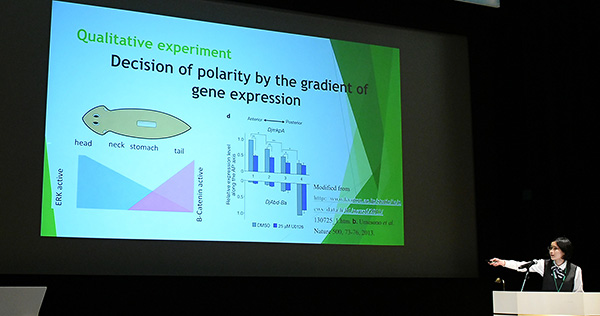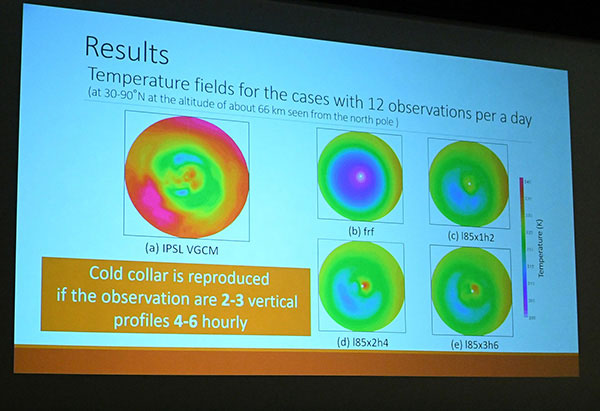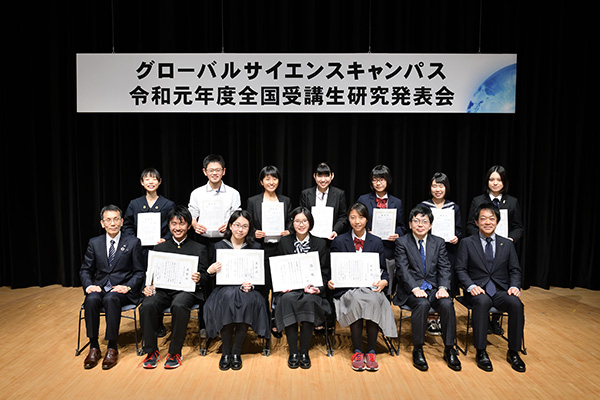News
High School Students Present Results at the Global Science Campus 2019 Session and Exchange Ideas on Research Updated in March 2020
On November 16-17, 2019, 50 students selected from around the country gathered at Miraikan (the National Museum of Emerging Science and Innovation) in Tokyo to present the results of their research projects and to network under the Global Science Campus (GSC) scheme organized by the Japan Science and Technology Agency (JST). The purpose of GSC is to foster next-generation global scientists, and was held in connection with JST’s annual science exhibit SCIENCE AGORA 2019.
50 Students with Ties to 15 Universities Presented Outstanding Research Results
GSC started in 2014 with cooperation between JST’s Department for Promotion of Science Education and Japanese universities to nurture young global leaders in science and technology. Fifteen universities nationwide offer science education programs to high school students. Approximately 750 high school students engage in highly specialized learning and research activities with support from university instructors. 2019 marks the sixth year for GSC. Fifty students from each collaborating university gave 39 poster presentations, ten of which went on to the second stage for oral presentations.
As a result of the final screening, a presentation from Ms. Mitsui Airi (a 3rd year student at Keimei Gakuin Senior High School) entitled “Measurement of planarian length: The first step to analyze the T. H. Morgan’s experiments in molecular level” won the MEXT (Ministry of Education, Culture, Sports, Science and Technology) Minister’s Prize. Her research was supported by Kobe University (joint collaboration from University of Hyogo, Kwansei Gakuin University, and Konan University).
Planarians are flat leech-like creatures living in freshwater, known for being able to regenerate themselves even after their bodies are cut into pieces. There are many previous studies on this high regenerative capacity, but Ms. Mitsui’s research focused on how to “quantify” the research into planarians.
In 1904, American geneticist Thomas Hunt Morgan published a paper which stated that planarians can regenerate “heads” instead of “tails” when they are cut “extremely short.” This phenomenon is called “polar reversal.” In order to verify the specific length of “extremely short,” there needs to be a quantitative evaluation.
Therefore, Ms. Mitsui focused on how to precisely measure the length of planarians. Planaria is highly elastic, and its length can change depending on its state. Therefore, there remains no known method for stably measuring its body length. Ms. Mitsui believed “it is indispensable to establish a method for measuring its body length to bring a 'quantitative aspects' to this research which has until now been performed 'qualitatively'.”

Ms. Mitsui presenting her project on “Establishing a method for measuring planarian length”
First, the planaria’s size was stabilized after applying some vibration. Once stabilized, it is cooled and solidified. Then the planaria is slid around inside a circular petri dish, and this motion is recorded on video in order to determine its length in a unique way. From video footage of 5 seconds or more, the body length is measured at three moments: at 1/4 of way through the video, at the halfway point, and at 3/4 of the way through the video. The team obtains the average of all the measurements, resulting in the final figure.
After trials with different sample bodies, this method proved effective in measuring planarian length in a consistent way. By increasing the resolution of the images, it is possible to see significant statistical difference between each individual planarian body within a difference in length of about 8%. Furthermore, by comparing unique body surface patterns of the Girardia dorotocephala (American planaria) which differ on an individual level, the team succeeded in accurately grasping the exact position to cut. Currently, the team is using this technique to conduct additional tests after Dr. Morgan’s experiment.
“These findings will enable quantitative studies of how planarians regenerate. By linking the expression levels of each gene to the precise location, my research could quantitatively evaluate Morgan’s findings. In the future, my research may be able to contribute to the development of regenerative medicine using, for example, iPS cells,” she concluded.
Ms. Mitsui’s interest in medical science was sparked by her admiration for Nobel laureate Prof. Yamanaka Shinya. She joined the GSC program at Kobe University in her second year of high school. She experienced research exchange with peers from around the country, and even presented her research results in the U.S. “I realized that taking in a wide range of interests is useful for research. I found out that I am interested in exploring biological mechanisms, so I decided to pursue a career in life science. It was such a fulfilling two days to talk together and exchange advice about our research results. It was fun, not an experience I could have had at school.”
Working in an International Research Team through GSC
The Japan Science and Technology Agency (JST) President's Prize went to Ms. Hosono Asako (a 2nd year student at Toshimagaoka Joshi-Gakuen Senior High School). She went through Keio University’s GSC Program which focused on data assimilation research to plan observations of radio occultation between atmospheric satellites around Venus.
Venus' solid geology resembles that of Earth, but its atmosphere is very different. The specific conditions of the lower layers of the Venusian atmosphere remain mostly unknown, because they are composed mostly of carbon dioxide (CO2), and areas 45-70 km from the ground are thick with clouds.
In the atmosphere above the northern polar region of Venus, there is a unique atmospheric phenomenon called “cold collar,” in which a low-temperature region is surrounded by warm regions. Study of the mechanism of this cold collar phenomenon continues.
A method using inter-satellite radio occultation, utilizing radio waves used for communication between spacecraft and ground stations is deemed promising as a highly precise observation method for clarifying Venus' atmospheric phenomena. The Akatsuki or VCO (Venus Climate Orbiter) is a Venusian probe operated by the Japan Aerospace Exploration Agency (JAXA). Akatsuki is equipped with a high-performance transmitter capable of transmitting radio waves with stable frequencies. When the transmitted radio wave is refracted by the Venus atmosphere, the received frequency changes. This frequency change can subsequently be analyzed. By observing areas with dense distribution of refractive indices, the team can analyze the distribution of atmosphere temperature.
Ms. Hosono, participating through GSC, and the international research group members are currently proposing to NASA their plan to use multiple Venus orbiters to achieve inter-satellite radio occultation. The goal of her research is to get NASA’s support for this proposal. By using the Venusian Atmospheric Circulation Model, developed in-house, the group is conducting simulation experiments assuming observation conditions. In order to obtain sufficient results, the team considered how many probes they should fly and how often.
By observing how precise the simulated cold collar is at different points and after different numbers of observations, the team compared the effectiveness of each observation method and concluded that cold collar could be reproduced when it is observed from 2-3 locations every 4-6 hours. The team also found that temperature observation can influence wind speed fields, and that there is efficient bias correction between different models.

Presentation slides from “Study for designing the future mission of radio occultation measurement of Venus atmosphere among small satellites using data assimilation”
With 3 probes, it would be possible to observe from 3 locations at intervals of 2-4 hours ─a feasible mission. Ms. Hosono stated that “Inter-satellite radio occultation observation was found to be effective at least for the reproduction of atmospheric phenomena in the polar region.” The team will prepare an experiment to simulate the observation system by considering operation in real orbit─where observation points can move. “We want to verify the usefulness of inter-satellite radio occultation observation for phenomena other than cold collar,” she summarized.
Regarding this prize, she stated that “It has been a wonderful experience being on an international team that includes overseas professionals. I couldn’t have won this prize alone. I would like to thank all the collaborating researchers, the instructors, and my family and friends who supported me.”
In addition to Ms. Mitsui and Ms. Hosono, there were two other special mentions by the judges: “Isolation of pathogenic Leptospira from soil in Okinawa Prefecture” (Ms. Kyu Ihon, 2nd year student at Okinawa Prefectural Kaiho Senior High School, collaboration with the University of the Ryukyus) and “Solid-state Diffusion Bonding of Ultra High Temperature Ceramics Composite to Tungsten” (Mr. Hikaru Tanaka, 3rd year student at Kumamoto Prefectural Tamana Senior High School, collaboration with Kyushu University). They were each awarded the special prize by the chair of judges. Six other prizes for excellence went out to oral presentations.
A Place for Networking among High School Students Working on Scientific Research
“These opportunities to form a network with top-level peers of the same generation will be useful in a variety of fields in the future. We hope that everyone who has studied at GSC will be active in the world as a science and technology expert capable of solving global issues,” commented Director-General Hishiyama Yutaka of the Science and Technology Policy Bureau at MEXT, who greeted the awardees at the ceremony.
Deputy Chair of the Global Science Campus Screening Committee, Sumida Manabu, evaluated the students' efforts: “The level of English and self-expression in the oral presentations were high, not to mention the content of the research.”
“[Ms. Mitsui] challenged a 100-year-old question that began with Dr. Morgan, and approached the challenge of measuring the length of living organisms by designing an experiment from scratch. It refreshes our minds to go back to the origin of science,” Mr. Sumida commented. Regarding Ms. Hosono, he said, “Her research and future potential is so valuable. She not only participated in an international research team, but she also found her own role and produced results.” He also mentioned Keio University─the collaborating university for Ms. Hosono—which works in partnership with overseas counterparts and research institutes: “Keio is a great example for other universities collaborating under GSC.”
Lastly, JST Executive Director Saeki Koji spoke on behalf of the GSC organizers: “I would like all participants to make use of this learning experience to connect with people through GSC, and to advance your career paths as globally active researchers. It is important to pursue your interest while acquiring broad knowledge at university, which will certainly benefit your future research,” he advised.

Group photo of awardees
Many of the awardees had seen senior students presenting their achievements last year, and since then have been working hard on their own research in order to stand here. As organizers, we hope that this presentation event will inspire junior GSC students and enhance future research activities.
Rao Chigusa
Department for Promotion of Science Education
Japan Science and Technology Agency (JST)







